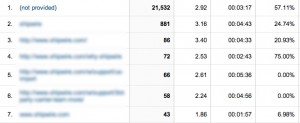Google Secure Search POV – Impact on SSL Searching
October 8, 2013
Table of Contents
On Sept, 23rd Google announced an update that impacts visibility to keywords used by a visitor coming to your website via an organic search on Google.com. This is an expansion of a previous Google update which was first announced in October of 2011 known as Google Secure Search.
Google Secure Search Updates
With Google Secure Search (HTTPs) Google does not pass the organic keywords that referred traffic to websites through the URL via Google.com searches. In the case of secure search the keyword parameter is recorded as “not provided.” When this news was first announced this was limited to signed-in Google users ( Gmail, YouTube, etc) on Google.com netting out to impact ~12% of the organic referrals originating from Google.com. Over the past two years, (not provided) data has grown significantly ( 60-70% in the month of September). It is important to note that Paid Search is not impacted by this change.
Overview:
Google will no longer provide organic keyword referral data due to Secure Search expanding to the entirety of their searches.
Impact:
In the near future when this fully rolls out, (not provided) will continue to increase and eventually all organic traffic from Google.com will no longer be mapped to a specific search query. This will affect the way marketers and webmasters look at organic data and measure the impact of optimization efforts.
Solution and Implications:
At a high level, keyword level metrics must now shift to a page-level focus. While the specific options available and tactics with which to measure are certainly in their infancy, there are a number of tools at our disposal that, when measured independtly don’t paint a comprehensive picture but when marreid together can help close the gap and build out the story of keyword performance:
- keyword rankings
- page-level data
- paid search data
- Google Webmaster Tools
- Google AdWords
- other search engine keyword data (which is not blocked)
Reliance on keyword planning tools and paid search data is increasingly important to gain insight to holistic site traffic and ROI trends. Paid Search will also play a larger role in content gap analysis and discovery through query reporting insights.
Conclusion:
At this stage, I don’t think there is a solid answer that fits all applications. This will certainly be a topic of high interest moving forward and Fuze will continue to share insights around this shift as they become available within our Search practice.
What are your thoughts or questions on this update? Leave them in the comments!



